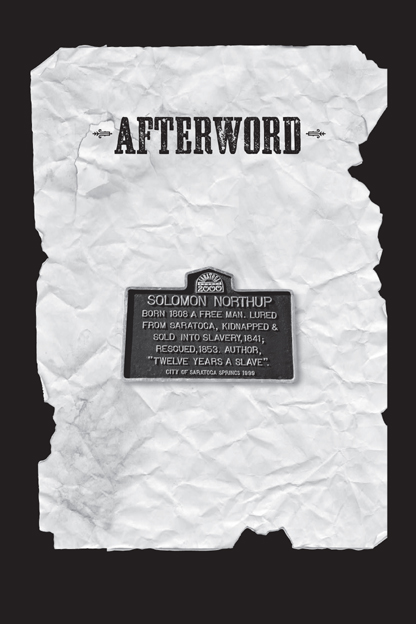
(Illustration Credits 1.30)

FROM 1780 TO THE EARLY 1860s LARGE NUMBERS OF slaves won their freedom, becoming known as free blacks or free persons of color. Escaping to the northern states and Canada was the most common way that slaves achieved their liberty. At least 50,000 slaves escaped by following the North Star to freedom.
Strange but true, another way that slaves won their freedom was by buying themselves. Slaves typically had one day of the week off—Sunday. By running errands and doing other tasks on Sundays, slaves were paid nickels and dimes in tips. After decades of earning small change, some slaves saved enough “Sunday money” to purchase and free themselves.
Often as their own lives drew to a close, slaveholders realized that slavery was evil. Some wrote out wills that would free their slaves as of a certain date. For example, according to George Washington’s will his slaves were to be set free after he and his wife, Martha, died.
While it is well known that many African Americans went from slavery to freedom, it is less known that thousands of black people went from freedom to slavery, mainly by being kidnapped like Solomon Northup. How many thousands suffered this fate is unknown because no records were kept chronicling all the free blacks who were enslaved.
The laws in the South actually encouraged the enslavement of free black people. One of the rules of law in the U.S. is that a person is presumed innocent until proven guilty. But in the South in slavery days, black people walking along a road or through a town were presumed to be runaway slaves and were arrested and jailed. The burden was upon them to prove that they were free.

Every year, on the third Saturday in July—the week of Solomon’s birthday—the city of Saratoga Springs celebrates Solomon Northup Day. Above is a photo of Northup’s descendants taken in 1999 after the mayor presented a historical marker to the city. (Illustration Credits 1.31)
To make things worse, in most of the South, African Americans who were jailed for any reason whatsoever were required to pay their jail and court costs. Those who lacked the money could be sold into bondage to pay the bills. The result was the enslavement of many free black people.
Another unjust law that was widespread in both the South and the North barred free black people from testifying in court. This meant that they had to sit silently at trials while fake evidence was brought forth identifying them as slaves.
Of course, slavery of any kind is evil. But famed African-American leader Frederick Douglass, himself a runaway slave, felt that there was something especially awful about the enslavement of free people like Solomon Northup. In 1853 Douglass wrote about Solomon: “Think of it! For thirty years a man, with all a man’s hopes, fears, and aspirations—with a wife and children to call him husband and father—with a home, humble it may be. Then for twelve years a thing, classed with mules and horses, torn from his home and family, and driven to toil in a cotton field, by the lash of an inhuman master. Oh! It is horrible. It chills the blood.”
The enslavement of free blacks lasted until 1865, the year slavery was abolished in the United States by the North’s victory in the Civil War. Then all the remaining Solomon Northups—and all the other slaves like Patsey, Old Abram, Wiley, and Eliza and her children—were forever released from bondage.